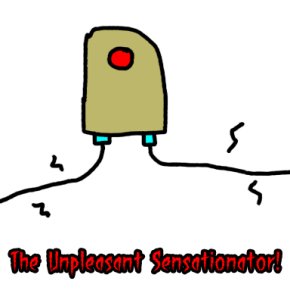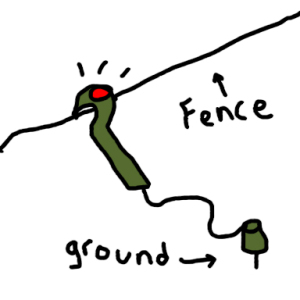Chickens and Electric Fences
Right about the time I was putting the finishing touches on my coop, I got a phone call from my mother. My uncle in Buffalo has a bit of a livestock menagerie, and thanks to a very determined raccoon, that menagerie had just gotten a little smaller. The raccoon had gnawed its way through the side of his coop and gotten in and killed all his chickens. It was the kind of thing where it just seemed like senseless violence, since they weren’t all eaten, but they all were dead. I’m not going to try to understand what was going through the raccoon’s mind, but I think it’s easier to accept a murdered chicken if it at least got eaten as part of the bargain. My uncle came home to his flock being scattered all over his driveway, and no longer an active flock. He told my mother about this, and that he now felt electric fences were the only way to go if you were serious about protecting your chickens. I wanted to be serious about protecting my chickens, and even though I was just about to put them out in the coop after a lot of effort in building the thing, I ordered a small electric fence. They could wait a few more days, if it meant being totally safe.
My main concern was that I was going to fry some poor animal that just came sniffing around because it’s natural for predators to want to eat chickens. I luckily could only afford a fence that ran on two D batteries, so that didn’t seem like a killing jolt to me. It turns out this model is meant to just give the animal an unpleasant enough sensation that they decide the coop is not a fun place to be, and they move on. A friend of mine in Alaska knows people who use the same one to protect their tents from bears while camping, so this seemed like it went high enough up the food chain that I’d feel safe, but not so powerful that there’d be bodies to dispose of.
Of course, having technology always opens you to the worry of whether or not the technology is working. Luckily, there is always more technology to be had, and so I also bought an electric fence tester. You hook one part over the wire carrying the charge, and then put another part into the ground, and a little light flashes if all is well. The charge isn’t always going through the wire. It’s more of a little zap that gets sent through every few seconds. I was already learning things! And the flashing of the tester was vaguely hypnotic.
I used the tester for about a week before the temptation to see how bad it would hurt if I touched the fence overtook me. One night, I eventually decided to just hit my knuckle along the side of the wire as the charge ran through and see what happened. It felt a little like a static shock you’d get from walking on the carpet and then touching a doorknob. This undid any sense of fear I might have had toward the fence, and I ditched the tool and went to knuckle-only testing.
Shortly thereafter, I was latching the run door while the fence was on, and the back of my hand grazed the wire. I then learned that the more skin you have touching the wire, the worse the shock is, and my respect for electricity returned.
So far, I haven’t any any signs of animals trying to get into the coop, but I don’t know how much of a role the fence even plays. I still do my best to make sure it’s functional, in case it’s doing a great job. This means making sure things stay off the wire. In the winter, I shovel the snow away from the sides of the run so there’s clearance, and in the fall, it means having to go out every night and pick leaves out of the way. Things that touch the wire and touch the ground will short circuit the whole thing. I know when this happens, because I can usually hear the short. It makes a faint popping sound. Once I even had it happen because I pulled the wires too tight and it was arcing onto the hardware cloth. That’s rare, but the leaves are a constant battle. And it gets even worse. When the leaves are down, and it rains, the slugs come out. The slugs will climb up the leaves onto the wire. Remember how I said the fence wouldn’t fry an animal? I wasn’t broad enough in my definition of animal. I have had slugs melt on the wires, and it’s both sad and gross. I’ll hear the familiar popping sound of a short, and then I have to turn my flashlight off so I can see where the flash of the spark is. I’ll find it, and then I’ll find a blob of matter on the line that I now have to clean off. A few shudders later, and everything is back up and running. Slugs were not what I expected to deter with the fence, but this is where I have found myself. I may put a fence around my cucumbers next summer. The slugs pose no real threat to the chickens, but I had but one viable cucumber this summer thanks to slugs, and while I don’t like killing anything, I do like cucumbers. It might be time to break out the nuclear cucumber option.
(CREDITS: Theme music: Chicken In The Barnyard by Fireproof Babies, Music Bed: Four Little Blackberries by Thomas Mills)
Tags: backyard chickens, chickens, Erik P. Kraft, hipster farming, predators





